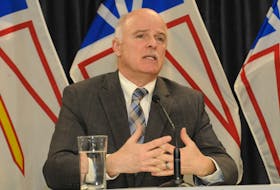St. John’s-based ophthalmologist Dr. Christopher Jackman says the provincial government is going too far with new regulation to keep cataract surgeries out of private clinics.
Jackman spoke out publicly last week.
Now, the Newfoundland and Labrador Medical Association (NLMA) has come forward expressing some of the same general concerns, saying they think the restrictions could affect more than eye care.
In a news conference and in a followup interview with The Telegram last week, Jackman said his understanding is that the province is adding a regulation to demand any eye surgeries involving the removal of a cataract take place in a hospital. That change would limit eye care options for some patients, he said.
A cataract is clouding of the lens at the front of the eye. Surgery removes the lens.
In ophthalmology clinics, where patients are offered a variety of procedures to improve their eyesight, there are other procedures as well. A “refractive lens exchange,” for example, could replace a person’s lens to address farsightedness, or other issues.
NLMA executive director Robert Thompson told The Telegram his association understands the government is trying to give a clearer definition of what exactly is an insured service under MCP. The concern, he said, is that in the process, government will unfairly limit the options of some patients.
In other words, as a byproduct of that procedure, if someone has a cataract or one is beginning to form, they wouldn’t have to worry about it. The cataract comes out with the old lens anyway.
Any surgery specifically to remove a cataract, doing a standard lens replacement, is a fully insured service in this province, covered by the Medical Care Plan (MCP).
The more advanced surgeries are a different kettle of fish. They can be elective, and come at a cost.
After some back and forth with eye specialists, the provincial government launched a campaign seeking patients who might have been confused, felt misled or taken advantage of by the system — paying when they weren’t expected to, say, or paying more than they had expected to, and feeling ill-informed — in an attempt to separate basic, insured cataract surgery from other procedures. There is no public record of responses to the government, including any indication of which doctors, hospitals or clinics were the target of dissatisfaction.
RELATED STORIES:
Former chair of Atlantic eye doctors group says illegal surgeries not happening in N.L.
N.L. Liberals take a closer look at eye care
RELATED LINK:
Medical Care Hospital and Insurance Act
According to Jackman, the equipment at his clinic for more advanced surgeries is not even available in provincial hospitals.
He wants to be able to do both the insured, basic cataract surgery and advanced surgeries — where cataracts are removed as a byproduct of the procedure — at his clinic.
He said the government’s restrictions mean people with cataracts will have far fewer options if they want to improve rather than just save their vision.
“Even though it’s the exact same procedure (a lens replacement), they won’t let you do it because you have the signs of a cataract,” he said. “This was very concerning to me because, for one, it’s a (restriction) that doesn’t exist anywhere else in Canada.”
According to the Department of Health, the new regulation is expected to be in place June 15 — tomorrow.
The Telegram asked the Department for an update on the regulatory amendment, but none had been received by Wednesday evening, when the NLMA waded in.
NLMA executive director Robert Thompson told The Telegram his association understands the government is trying to give a clearer definition of what exactly is an insured service under MCP. The concern, he said, is that in the process, government will unfairly limit the options of some patients.
“If the government puts in place this new regulation, new approach, it will mean that people who have healthy lenses will be able to get this (enhanced, out-of-pocket) service … but if anyone has a cataract … they would be required to only access the service as an insured service in a hospital,” Thompson said, adding the issue has the potential to go beyond eye care and cataracts, based on the NLMA’s perception of how the regulation will be worded.
The NLMA, he said, doesn’t want a prohibition against any particular medical service simply because it can, as a byproduct, also take care of an issue that could otherwise be dealt with under MCP in a hospital.
The Telegram spoke with Thompson shortly before 5 p.m., when a letter was also issued by NLMA president Tracey Bridger to all members.
“The background on this regulation arises in the area of cataract surgeries and a separate non-insured service, but the principles that lie behind the government’s position could affect other disciplines,” she stated, noting she obtained her information on the new regulation via the CBC.
Both the NLMA and Department of Health have acknowledged the province established a barrier in 1998 to insured services being moved outside of the hospital setting. A new committee, established under the last agreement between the province and physicians, is working to determine what additional procedures — if any — might be offered outside the hospital setting, in private doctors’ offices, and under what conditions. In other provinces it includes select procedures in MRI clinics, cataract clinics, orthopedic surgery clinics, colonoscopy and endoscopy clinics.
Jackman said 25 per cent of cataract cases in Ontario in the past year were performed in centres like his — not in a provincial hospital.
Cap on OR time
The situation now, he said, when he goes to hospital operating rooms here to complete surgeries covered by the province, is that there is a cap on the number of cases he can tackle in the OR time he is allotted.
“For the last 12 years for myself, I have a day a week for operating room time and the government only allows me to use half of that time. So, the OR goes empty for the rest of the day,” he said, adding that’s despite all of the required staff being there, paid for the full time.
He believes the cap is due to the cost per surgery.
“They’re worried about costs,” he said.
As for wait times here, he sees them getting longer. The province has moved from seven ophthalmologists two years ago to five now, Jackman said, with another specialist expected to leave in the next two years, and one not currently taking consults.
That’s in addition to an aging population more likely to develop vision problems and increasingly interested in addressing eye problems to maintain quality of life.
But the national director of policy and advocacy at the Canadian Health Coalition, Amanda Wilson, told The Telegram her organization sees private clinics as a risk when it comes to costs and the maintenance of a truly public health system.
There are other options to help address wait times in hospitals, she said, pointing to an Ontario Health Coalition report from June 10, 2017, that looked at private clinics across Canada. It stated more private clinic work actually led to higher costs for patients, by encouraging unnecessary tests, charging additional fees to the patients directly, and in some cases breaking the law by charging both patients and government for the same expenses.
Patients reported feeling confused and pressured in some cases, despite there being clear guidelines in provinces, including Ontario, on how patients are to be informed about procedures.
The report referred to a survey of 136 private clinics of various types in Canada, with just one — in ophthalmology — based in Newfoundland and Labrador. That clinic wasn’t part of the coalition’s final findings, because of the lack of data available from here versus other provinces.
But facilities surveyed in Ontario included “boutique clinics” with membership fees for access to a specific group of doctors and executive care packages with fees “far more than the average Canadian can afford to pay.”
The provincial government here has refused to comment specifically on Jackman’s statements or his clinic, as the two parties are currently in a civil dispute.









